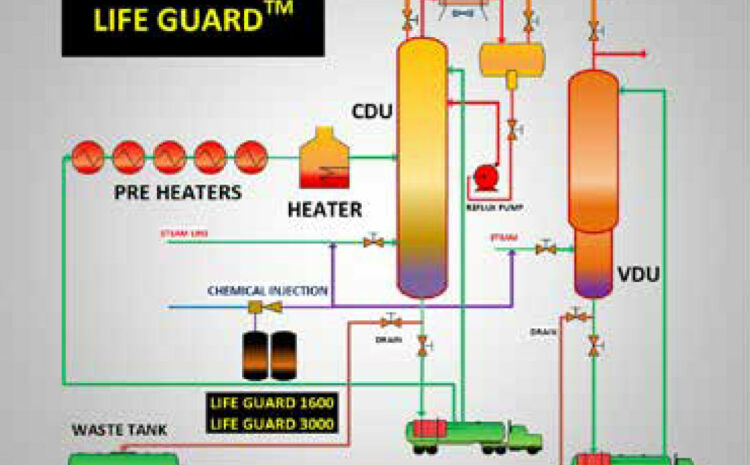
Chemical Decontamination
Vapor Phase Decontamination
Life Guard™ from Philip services (PSC) is a highly effective vapor phase decontamination product, as it has a high solubility of Hydrocarbons in vapor phase, it can access surface and deposits that cannot be contacted by liquid flow. Vapor phase application is equally effective for light end as well as heavy end products and offers rapid decontamination (within 8 – 12 hours) with minimal effluent generation making it an increasingly popular methodology with our clients.
Life Guard™ chemistry is entrained into a steam source. The steam carries the chemistry throughout the process vessels. The solvent in the product vaporizes, dissolving the hydrocarbons as it proceeds over the vessel. The Life Guard™ chemistry forms a strong emulsion with the hydrocarbons and then drained from the process vessels with condensed steam. Residual chemical is steamed out, completing the decontamination cycle.
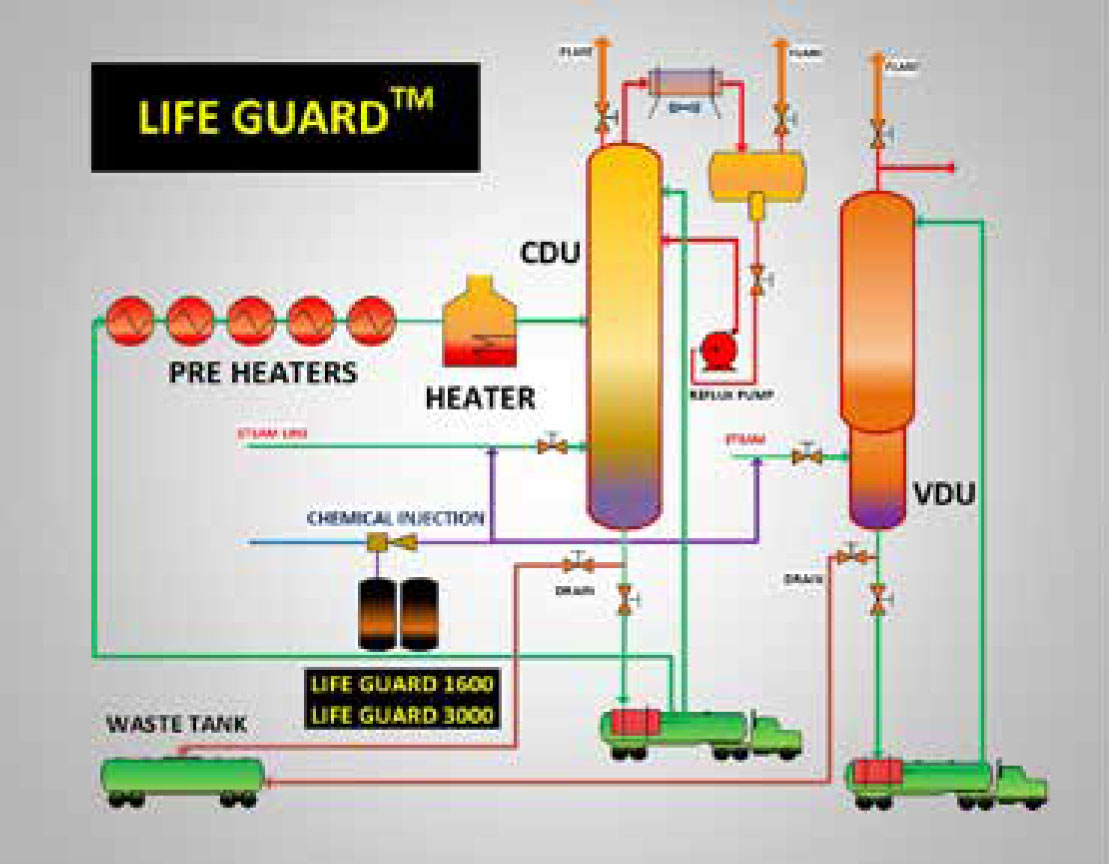
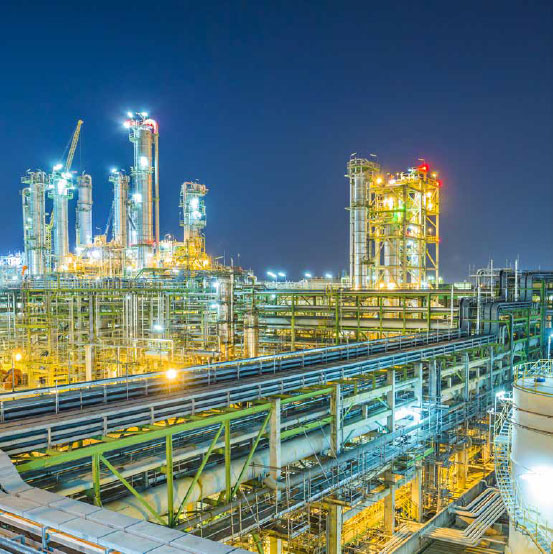
Liquid Phase Decontamination
Life Guard™ chemistry are exceptionally effective in removing both heavy end hydrocarbons such as vacuum residue and asphalt and as well as light end hydrocarbons such as benzene from the process vessels in refineries and petrochemical plants.
A typical concentration of Life Guard™ for the process application is 0.5% to 2% in water. During the decontamination process, the equipment will be vented first to the flare system and afterward to the atmosphere. This aqueous solution of Life Guard™ is circulated in a closed loop through the plant process vessels and piping at 70⁰ to 90⁰ for 8 to 12 hours (wash cycle). In the wash cycle, Life Guard™ forms a stable emulsion with the hydrocarbons present in the plant equipment and piping. At the end of the cycle, the emulsion is pump out of the system to complete the Decontamination.
The effluent emulsion generated during the decontamination is stored in a holding tank and is then broken down using a demulsifier to allow recovery of the hydrocarbon that is removed from the process equipment. The subsequent aqueous phase is discharged to the plants API or waste treatment facility and the oil is sent to slop tank for reprocessing.
Successful Applications
OZEST has successfully applied Life Guard™ in petrochemical and refinery system, treating desalters, crude units, vacuum towers, hydrotreaters, hydrocrackers, visbreakers, isomerization units, platformers and reformers, amine units, sour water system, delayed cockers and ethylene compressors and quench water systems.
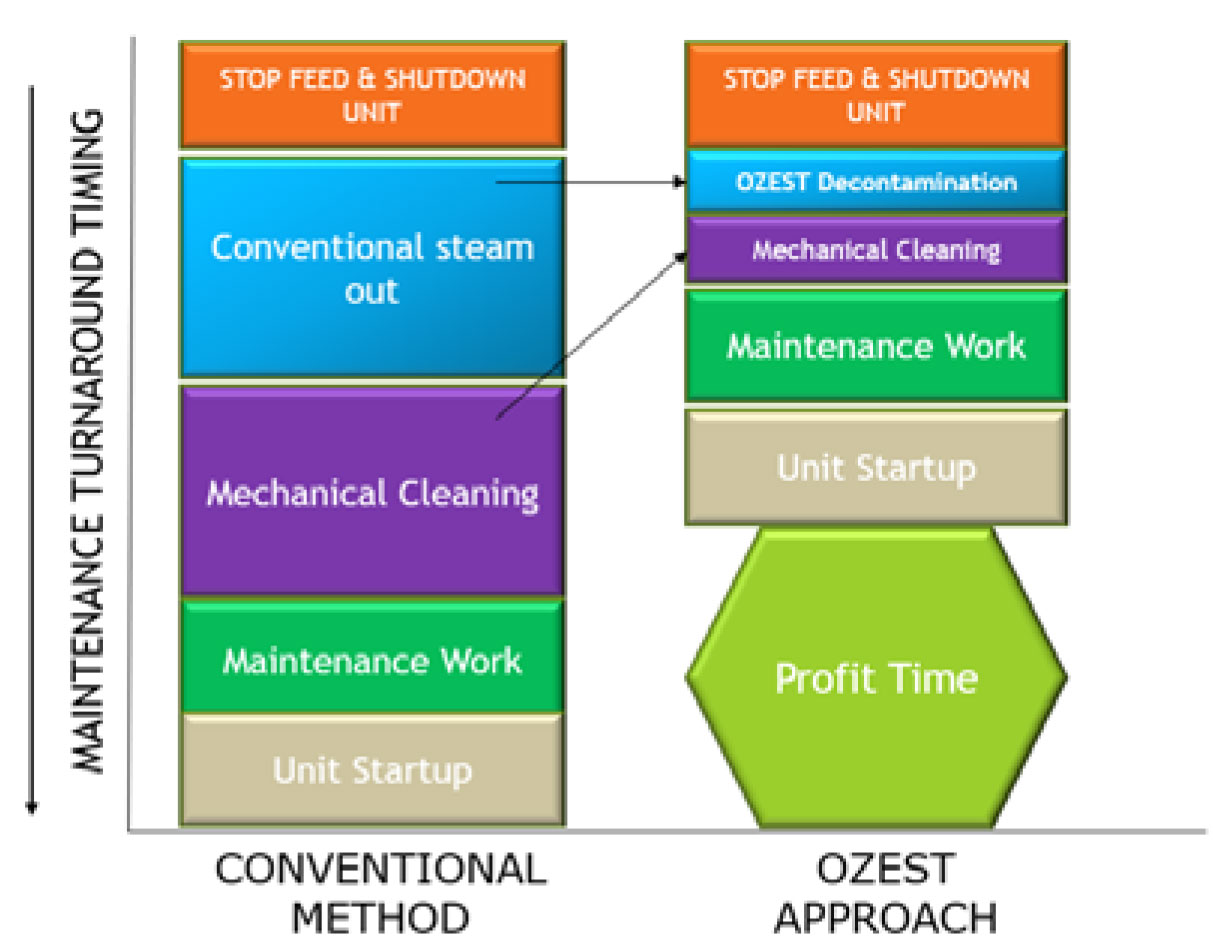
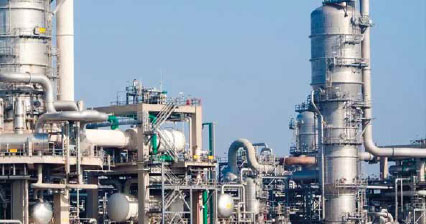
Since 2000, OZEST has safely performed various Decontamination jobs for
• Vacuum towers
• The cracked gas compressor system
• Asphalt tanks
• Quench water columns
• Crude towers
• Exchangers
• Tanks
• Re-boilers
• Fractionators
• Strippers
• Ethylene compressors
• Fin fan coolers
• Desalters
Life Guard™ greatly reduces the time it takes to ensure that benzene is reduced to less than 0.5 ppm and in doing so reaches well below the Lower Explosion Level and Personnel Exposure Limits for the light end distillates. Steaming a large unit may take up to 5-6 days, but using Life Guard™ system this is reduced to 12-24 hours.
This gives faster access to systems and increasing safety and profitability.
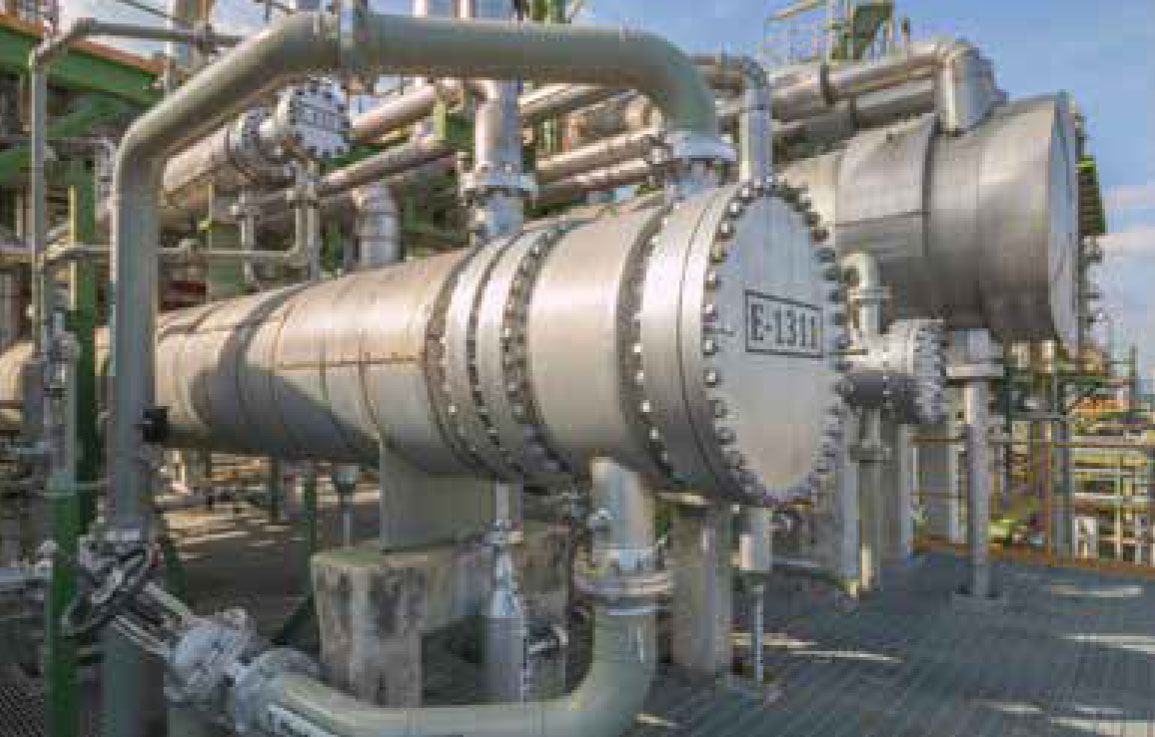
With PSC/OZEST Life Guard™ decontamination programs, benzene and other hazards associated with refinery and petrochemical processing can be eliminated in a fraction of the time normally associated with a shutdown. OZEST provides technical refinery expertise to enhance our turnkey service and to ensure that every detail is properly addressed. The processes apply to crude units, FCCU units, lube oil plants, ethylene, olefins and butadiene plants as well. Our programs combine unique, environmentally safe chemical products with state-of-the-art mobile pump and filtration systems. Furthermore, we can customize the service for various plant equipment including refinery distillation and fractionation towers, accumulators, drums, reactors, and exchangers. It also safely removes Pyrophoric Iron Sulfides and residual H2S using second stage process that takes only 4 – 6 hours in most cases.
PSC/OZEST closed loop system Life Guard™ makes EPA and OHSA compliance much easier to achieve.
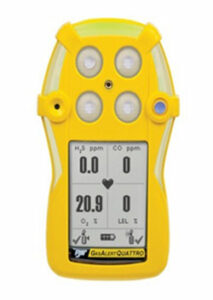
The major benefits are:
- Zero LEL
- Zero H2S
- Less than 0.5 ppm Benzene
- No steaming out or Nitrogen purging required
- Less heat exchangers to be pulled during the shutdown if included in the process.
- Time-saving.
- Pyrophoric materials will be oxidized
- Partial scales removal (when the scale is bounded with hydrocarbon)
OZEST offer more than a chemical-cleaning vendor does. We take a comprehensive approach as if the refinery belongs to us. In general, the client will determine what equipment within the unit is to be decontaminated. OZSET will design a detailed procedure with regards to the most cost-effective method. OZEST walks every job and with the continuous support of PSC designs the most efficient circulation loops to facilitate the decontamination of entire unit. OZEST’s customers offer the best support for the effectiveness of our decontamination processes.
OZEST deliver decontamination chemistry Life GuardTM both in the Liquid Phase and the Vapor Phase. Life GuardTM hydrocarbon decontamination formulation that is environmentally safe, fully biodegradable, and compatible with all metallurgy. The specific mode of application, such as vapor phase or liquid circulation, or a combination of the two, is tailored during the site visit, where the exact scope of work and availability of resources is discussed in detail with the plant personnel.
Vapor Phase Decontamination
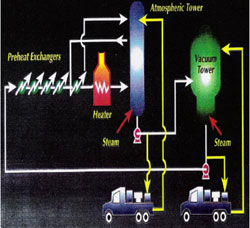
Life GuardTM from Philip services (PSC) is a highly effective vapor phase decontamination product, as it has a high solvency value in vapor phase, it can access surfaces and deposits that cannot be contacted by liquid flow. Vapor Phase application is particularly effective on light end and as well as on heavy end products and offers rapid decontamination with minimal effluent generation making it an increasingly popular methodology with our clients.
Life GuardTM chemistry is entrained into a steam source. The steam carries the Life GuardTM chemistry throughout the process vessels. The solvent in the product partially vaporizes, dissolving the hydrocarbons as it proceeds over the vessel. The Life GuardTM chemistry forms a strong emulsion with the hydrocarbons and the condensed steam. This emulsion is then drained from the process vessels and the vessels are steamed further to remove the residual product, completing the decontamination cycle.
Liquid Phase Decontamination
Life GuardTM chemistry are exceptionally effective in removing heavy-end hydrocarbons such as vacuum residue and asphalt, as well as light end hydrocarbons such as benzene, from the process vessels in refineries and petrochemical plants.
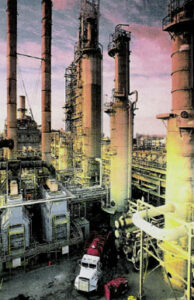
A typical concentration of Life GuardTM for a process application is 0.5% to 2% in water. During the decontamination process, the equipment will be vented first to the flare system and afterward to the atmosphere. This aqueous solution of Life GuardTM is circulated in a closed loop through the plant process vessels and piping at 70º to 90ºC for 8 to 12 hours (wash cycle). In the wash cycle, Life GuardTM forms a stable emulsion with the hydrocarbons present in the plant equipment and piping. At the end of the wash cycle, the emulsion is pumped out of the system, thus transporting the trapped hydrocarbons out of the system. The system is then rinsed with fresh water to displace the residual emulsion out of the system. And the decontaminated unit will have zero LEL, less than 0.5 ppm of benzene, and zero H2S
The effluent generated during the decontamination process is typically pumped off to a holding tank, The emulsion that is formed is then broken down in a fracturing tank using a demulsifier to allow recovery of the hydrocarbon that is removed from the process equipment. The subsequent aqueous phase is discharged to the plant’s API or waste treatment facility and the oil is sent to slop tank for reprocessing.
Successful Applications
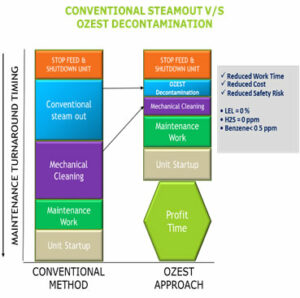 OZEST has successfully applied Life GuardTM in petrochemical and refinery systems, treating desalters, crude units, vacuum towers, hydrotreaters, hydrocrackers, visbreakers, isomerization units, platformers, and reformers, amine units, sour water systems, delayed cokers and ethylene compressors and quench systems.
OZEST has successfully applied Life GuardTM in petrochemical and refinery systems, treating desalters, crude units, vacuum towers, hydrotreaters, hydrocrackers, visbreakers, isomerization units, platformers, and reformers, amine units, sour water systems, delayed cokers and ethylene compressors and quench systems.
Life GuardTM greatly reduces the time it takes to ensure that benzene is reduced to less than 0.5 ppm and in doing so reaches well below the Lower Explosion Level and Personnel Exposure Limits for the light end distillates. Steaming a large unit may take from 24 – 72 hours, but using Life GuardTM system, this is reduced to 15 – 48 hours. This gives faster access to systems and increasing safety and profitability.
Since 2000, OZEST performed safely various Decontamination jobs for:
- Vacuum Towers
- Re-boilers
- The cracked gas compressor system
- Fractionators
- Asphalt tanks
- Strippers
- Quench Water Columns
- Ethylene compressors
- Crude towers
- Fin fan coolers
- Exchangers
- Desalters
- Tanks
Detailed project summary can be submitted upon request.
